Kitchener Market Snapshot for May 2020
Wednesday, June 3rd, 2020Home Sales Climb in May Compared to Record-Low April
Average Sale Prices Show Strength
KITCHENER-WATERLOO, ON (June 3, 2020) ––There were 419 residential homes sold through the Multiple Listing System (MLS® System) of the Kitchener-Waterloo Association of REALTORS® in May 2020, a decrease of 40.5 per cent compared to May 2019, and an 80 per cent increase compared to April 2020 when sales contracted sharply due to COVID-19.
“Real estate was included as an essential service in Ontario from the outset of the COVID-19 shutdown, and Realtors have stepped up to ensure those who need to list or buy can do so safely,” said Colleen Koehler, President of KWAR.
Total residential sales in May included 255 detached homes (down 41 per cent from May 2019), and 42 condominium apartments (down 42.5 per cent). Sales also included 79 townhouses (down 42.8 per cent) and 43 semi-detached homes (down 29.5 per cent).
The average sale price of all residential properties sold in May increased 6.5 per cent to $568,275 compared to the same month last year, while detached homes sold for an average price of $657,274 an increase of 5.4 per cent. During this same period, the average sale price for an apartment-style condominium was $330,336 for an increase of 0.6 per cent. Townhomes and semis sold for an average of $454,197 (up 13 per cent) and $482,479 (up 11.4 per cent) respectively.
The median price of all residential properties sold in May increased 10.1 per cent to $545,000 and the median price of a detached home during the same period increased 9.6 per cent to $630,000.
“In May we saw the strong appetite for homes in the Kitchener-Waterloo area is still very much alive,” said Koehler. “But as the virus continued to circulate in the community many would-be sellers were reluctant to put their homes on the market. For the homebuyers who cannot wait out the pandemic, they are not finding any fire sales as homes are not only maintaining their value, but also increasing.”
There were 577 new listings added to the MLS® System in KW and area last month, a decrease of 48.7 per cent compared to May of 2019, far fewer than the previous 10-year average of 1,035 listings in May.
The total number of homes available for sale in active status at the end of May was 567, a decrease of 43.9 per cent compared to May of last year.
The number of Months Supply (also known as absorption rate) continues to be very low at just 1.3 months for the month of May, 38.1 per cent below the same period last year. The previous ten-year average supply of homes for May was 3.25 months, and in the past 5 years, the average supply for May was 2.32 months.
Koehler acknowledges the pandemic has pushed even the most traditional real estate practitioners to adopt to digital and virtual technology to interact with clients. She advises consumers should talk to their Realtor about the digital tools they use to minimize the need for physical contact and to ensure that all of Health Canada’s guidelines are in place to reduce the risk of transmission of the virus when in-person showings are required.”
The average days to sell in May was 20 days, compared to 19 days in May 2019.
Media Contact: Tania Benninger, Stakeholder Relations, 519-584-1141
Read Online: https://kwar.ca/category/market-updates
Historical Sales By Property Type

Months Supply of Homes for Sale

Historical Median Sales Price – By Property Type

Historical Average Sales Price – By Property Type

Historical Sales – By Price Range


KWAR cautions that average sale price information can be useful in establishing long term trends but should not be used as an indicator that specific properties have increased or decreased in value. The average sale price is calculated based on the total dollar volume of all properties sold. Months Supply is the inventory of homes for sale at the end of a given month, divided by the average monthly closed sales from the last 12 months Those requiring specific information on property values should contact a local REALTOR®. REALTORS® have their fingers on the pulse of the market. They know the questions to ask, the areas to probe and what to look for so that you get a complete picture of the property and community you’re considering.











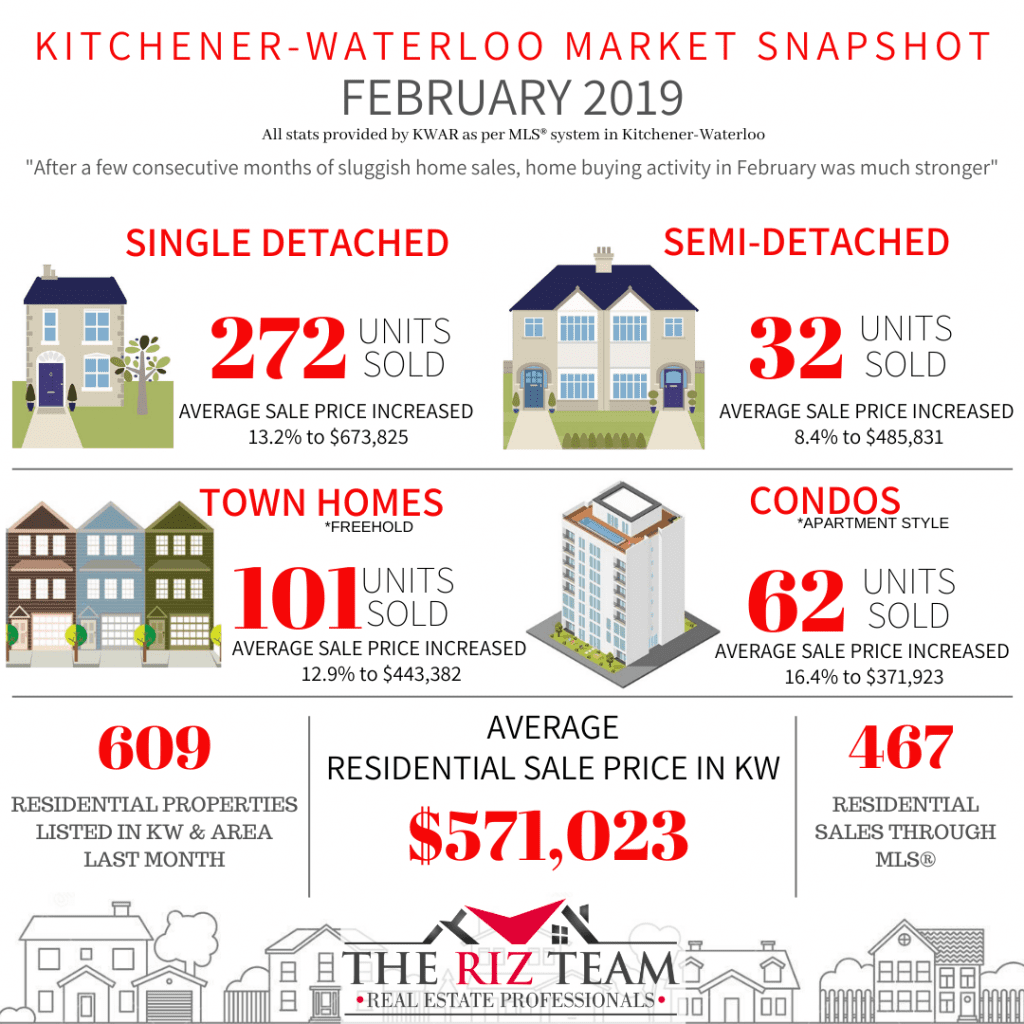






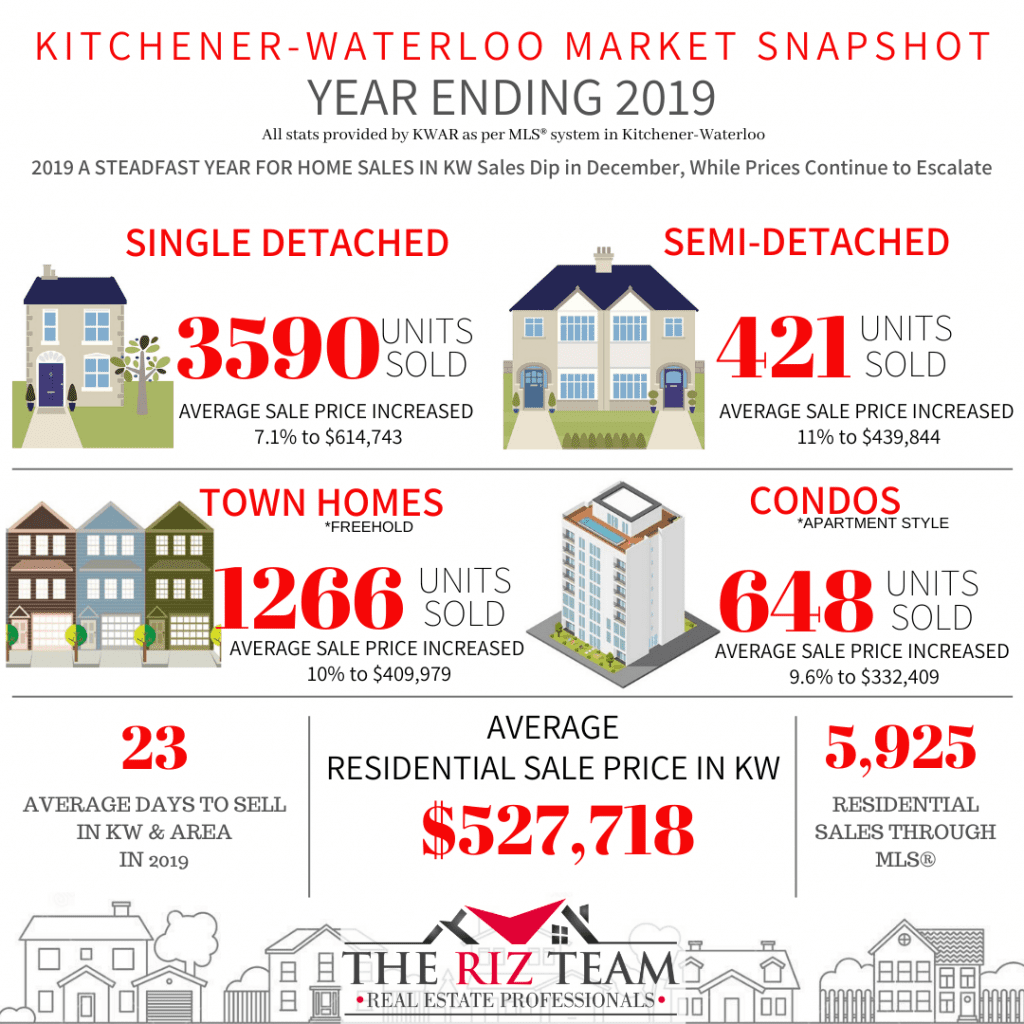




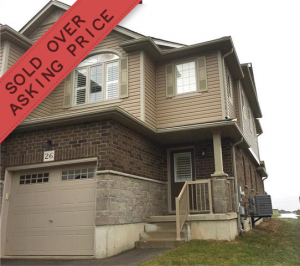 Property 2: This Kitchener Townhome situated in popular Huron Village was listed on January 19, 2017 and sold in 2 days for 110% over the asking price with numerous offers.
Property 2: This Kitchener Townhome situated in popular Huron Village was listed on January 19, 2017 and sold in 2 days for 110% over the asking price with numerous offers. Property 3: This Laurelwood, Waterloo single detached home sold within 6 days of listing on January 18, 2017 for 105% over the asking price with many buyer offers.
Property 3: This Laurelwood, Waterloo single detached home sold within 6 days of listing on January 18, 2017 for 105% over the asking price with many buyer offers.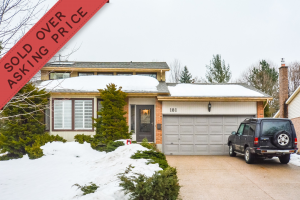 Property 4: This detached backsplit home nestled in the Maple Hills area of Westmount, Waterloo was listed on January 18, 2017 and sold in multiple offers for 117% over the asking price in just 6 days.
Property 4: This detached backsplit home nestled in the Maple Hills area of Westmount, Waterloo was listed on January 18, 2017 and sold in multiple offers for 117% over the asking price in just 6 days. Property 5: This end unit townhome in Laurelwood lasted only 6 days while being offered 40 offers and netting 132% over the asking price after being listed on January 18, 2017.
Property 5: This end unit townhome in Laurelwood lasted only 6 days while being offered 40 offers and netting 132% over the asking price after being listed on January 18, 2017.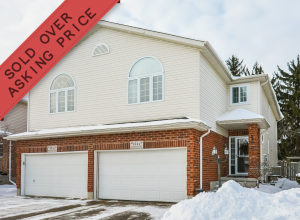 Property 6: This Eastbridge, Waterloo Semi-Detached home was listed on January 17, 2017 and sold within 7 days at 127% over the asking price in multiple offer bids.
Property 6: This Eastbridge, Waterloo Semi-Detached home was listed on January 17, 2017 and sold within 7 days at 127% over the asking price in multiple offer bids. Property 7: This single detached home in sought after Laurentian Hills, Kitchener was listed on January 16, 2017 and sold within 6 days for 112% over the asking price in multiple offers.
Property 7: This single detached home in sought after Laurentian Hills, Kitchener was listed on January 16, 2017 and sold within 6 days for 112% over the asking price in multiple offers.



